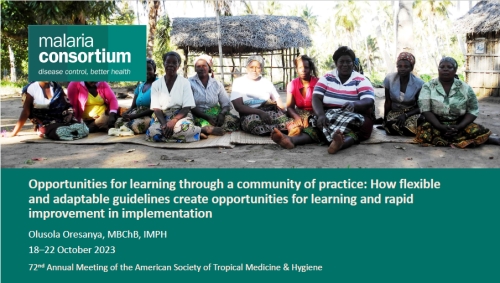
Publication Date:
20/10/2023
Author:
Olusola Oresanya
Type:
Presentation

Opportunities for learning through a community of practice: How flexible and adaptable guidelines create opportunities for learning and rapid improvement in implementation
Publication Date:20/10/2023
Author:
Olusola Oresanya
Type:
Presentation
A community of practice for perennial malaria chemoprevention will enable countries to share experiences and learn from one another and avoid duplication of efforts.
In June 2022, the World Health Organization (WHO) issued new guidelines for malaria. The updated guidelines represent a paradigm shift from previously prescriptive recommendations to greater flexibility in adapting control strategies to country contexts. This gives countries the prerogative for decision-making on the combination of malaria control strategies to deploy, the delivery strategies to use, how often those interventions should be given and many other data-driven and context-specific decisions. This paradigm shift presents both opportunities and challenges for malaria programmes, including perennial malaria chemoprevention (PMC).
At least 11 countries are now involved in PMC implementation or research representing a range of geographies and contexts. These countries are being supported by several donors and implementing partners, creating a wealth of implementation experience, tools and lessons learned in partnership with governments. A PMC community of practice (CoP) would facilitate information exchange and coordination to support decision-making at the country level as well as context-specific policy development, implementation and scale-up.
This presentation was given at the 72nd annual meeting of the American Society of Tropical Medicine and Hygiene.
Country: Cameroon | Mozambique | Nigeria | Sierra Leone | Togo
Keywords: ASTMH | Chemoprevention | Data-informed decision-making | Malaria | PMC | Policy development | SDGs
« Back to Publications